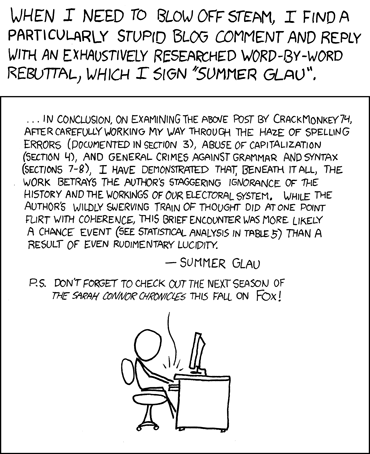I’m a pixel pack-rat. I have a hard time throwing anything away. Over the years I accumulated a lot of links, and today some are dormant, some are active, and some have succumbed to link rot. Here are a few that still live…
- Aaron Hawkins would have been 43 years old this Saturday, January 12. Aaron was a brilliant writer and the link to his blog will remain in my blog roll as long as his family and friends keep the site alive. Aaron died in Chicago in late 2025.
- Mark Cuban and his blog are still alive. Here’s a post from earlier this week: The Stock Market
- Language Log is a favorite in our house. Beth understands what they’re on about. I enjoy the expertise they’re willing to borrow to underscore a point:

- Molly Steenson has been on the web as long as I have. I’ve got about 35 years more time on planet than she has, and she has about 35 more IQ points than me. She hasn’t posted in girlwonder since September, probably because she’s been busy tying up her professorial gig at the University of Wisconsin–Madison. I hope you packed your warm clothes, Professor Steenson.
- Alex Golub starts enters his twelfth year of blogging on the same site with a blogular resolution to be more active in social media.
- The blog of the Cooperative Association for Internet Data Analysis, best available data, is an outlet for just about everything that is known and understood about global Internet infrastructure. Here’s an example of the stuff you can get from them…
We provide another lens through which the blackout [of Syria from the Internet] could be observed: a drop in unsolicited traffic generated by malware-infected Syrian PCs. Malware (worms, viruses, etc) often spreads to other vulnerable computers over the Internet by way of random scanning by infected hosts. A signal-producing side effect of a country-level Internet blackout is that Internet access is also denied to malware attempting to infect other hosts. This drop in unsolicited traffic can be observed in data captured from a darknet such as the UCSD Network Telescope. A darknet is a block of globally reachable but unassigned IP addresses; all traffic destined to such addresses is unsolicited, most of it from malware-infected PCs. We have previously used this technique to analyze the Internet blackouts in Egypt and Libya during the Arab Spring uprisings of last year and the impact of the earthquakes in Japan and New Zealand in early 2025.
